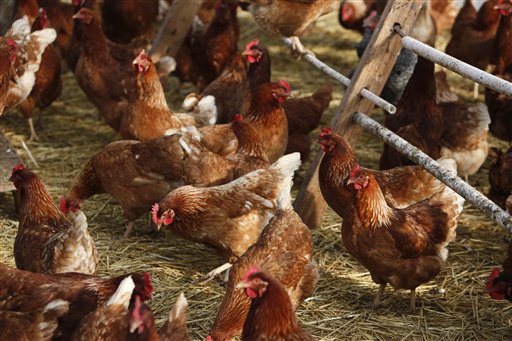World’s first-ever sale of lab-grown chicken meat harkens to a better future
Lab-grown meat can help eliminate much of the ethical and environmental concerns surrounding industrial livestock production

AP
Chickens are seen on a farm near Vacaville, California
The other day, I came across some news that I’m surprised didn’t garner more attention. In Dec. 2020, Eat Just, Inc. made history with the world’s first-ever commercial sale of lab-grown chicken meat.
While this news has flown under the radar, I believe it may well be one of the most important developments of the past year. Lab-grown meat, which scientists develop from animal cell cultures, holds the potential to completely transform an essential aspect of human life—what we eat.
To grasp why this news is so consequential, one must first understand that industrial livestock production, which lab-grown meat would help replace, merits elimination. Raising livestock in an industrial system is problematic for two key reasons: it rests on shaky ethical foundations and represents a significant contributor to the climate and ecological crises.
Without a doubt, industrial livestock production is one of the greatest tragedies ever perpetrated by humanity. Every year, we imprison and slaughter billions of sentient beings with complex emotions in a mechanized fashion. In light of the world’s first-ever commercial sale of lab-grown chicken meat, let’s specifically examine chickens and their role within this tragic agricultural system.
Research indicates that chickens can feel pain and distress, are strikingly intelligent, and may even exhibit empathy. Yet, in the United States alone, more than 9 billion chickens are killed each year. And this figure does not even include the billions of deformed, selectively-bred broiler chickens (raised for meat) that die because of their deformities, and the males from egg-laying breeds slaughtered as hatchlings.
Industrial livestock production’s contribution to the climate and ecological crises also merits substantial attention. For one thing, the conversion of forests and other wildlands into livestock ranches adds to diminishing global biodiversity. And industrial livestock production contributes to climate change in part because the digestion of ruminants such as cows and sheep releases methane, a greenhouse gas 28 times more potent than carbon dioxide.
Over the past few decades, these concerns (both ethical and environmental) about livestock production have led millions of people to vegetarianism or veganism. According to a Gallup poll conducted in 2018, approximately 8% of American adults now practice one of these diets.
The problem is that, while the number of vegans and vegetarians has grown exponentially, it would be infeasible to expect 100% of the population to follow these diets anytime soon. I think my personal decision to eat meat reflects a broader conscience.
While I admire people who choose veganism or vegetarianism, I find it easier to obtain the nutrients I need by eating meat and, to be honest, would find it difficult to give up the taste of meat. And a lot of people likely feel the same.
In recent years, many companies have begun selling plant-based faux meat options. Some of these products taste amazing, sometimes even better than real meat. Nevertheless, while most people might agree that while good faux meat can be great, it’s just not the same as real meat.
So, over the past decade, researchers at universities and private companies around the world began to pursue the seemingly impossible: growing meat in a lab. Co-opting tissue engineering technologies initially developed in the regenerative medicine field, these pioneers have revolutionized cellular agriculture.
When Singapore granted Eat Just, a private company based in San Francisco, permission to sell lab-grown chicken last month, a decade of these multilateral efforts finally reached fruition. According to Eat Just CEO Josh Tetrick, the cultured chicken is nutritionally the same as conventional chicken, though it tastes slightly different.
Regardless, this development represents an enormous step forward, not just for Eat Just or other cellular agriculture pioneers, but also for all humankind. Lab-grown meat holds the potential to completely alter what we as humans eat and how we obtain our food. It can erase much of the ethical and environmental concerns surrounding industrial livestock production.
Symbolically, on Saturday, Dec. 18, the restaurant 1880 in Singapore served the first restaurant meal featuring Eat Just chicken to a group of young activists under the age of 18. Lab-grown chicken meat is the future—it could be the start of something truly transformative and new.






































